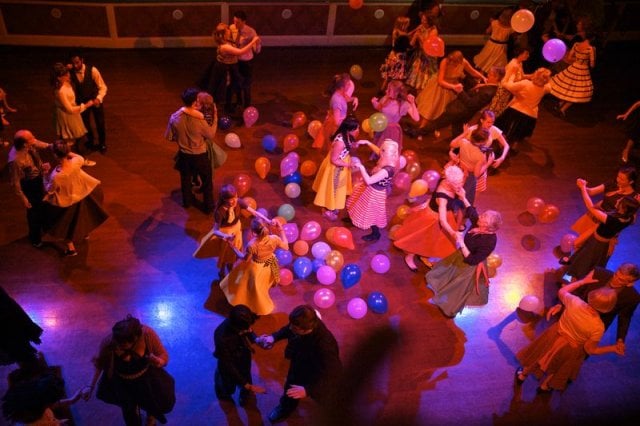
A performance of Our Dancing Feet following the balloon drop
Photo: Ray Gibson
What is community theatre?
Isn’t all theatre ‘community’ theatre, asks Sara Clifford as she explores why so many people write it off as just amateur, worthy and poor quality.
In March, my company Inroads co-produced the site-specific Home Fires with Brighton’s Zap Art. Set in World War I, it took place in Newhaven Fort, the town’s best-known landmark. It followed Our Dancing Feet, an intergenerational promenade piece, and The Port, The Beast and The Traveller, also at Newhaven Fort. All involved professional creative teams and were stories inspired and informed by the site and the people who live nearby, many of whom took part as dancers, singers and musicians (the community).
I wrote the scripts for all of them and have noticed that community theatre seems to bring on a rash not only in the press (who often won’t cover it) but also in my fellow practitioners, despite the fabulous credentials of our creative team. So why is it so problematic? What about the work of Graeae – is that just community theatre? Or Who Cares at the Royal Court? Or any of the Clean Break plays? A play about the bombing of the Grand Hotel? Are these just issue-based community theatre?
Isn’t that what we are always talking about – that we don’t just want to perform to a middle-class audience or preach to the converted?
A while back, I was commissioned by Oxford Touring to write a play about falling, working in collaboration with the Falls Service for older people in Oxfordshire. On the face of it, not the most thrilling of subjects. But there are many interpretations of the word ‘falling’. We may fall over, but we also fall in love, fall out of love, we fall towards something, we fall from grace. And so I wrote about an older woman who falls over, but as she lies, shivering on the landing, she remembers her own fall from grace when she was a young woman, and, through the restorative power of Dr Theatre is able to meet her younger self and forgive herself. As part of my research, I worked with a group of older and disabled dancers, led by Cecilia Macfarlane, and together we explored the many interpretations of falling through movement and dance, which then inspired and informed the script. This project was a game changer for me. What is community theatre, what topics, what audience? How can we, as artists, make great stories for and with a broader audience? If we put someone’s story on stage for an audience who haven’t experienced it, are we guilty of cultural voyeurism? Is it any different when those people are real and in the room? Or does that actually add value to what we are doing?
So, is it about audience? Is there one audience that is a theatre audience, and one that isn’t? I have heard people refer to the families and friends of our local performers as ‘not a real audience’. If we create theatre in what might be called community spaces, such as dance halls or old warehouses, could this offer a more accessible performance space?
So what do we mean by the word ‘community’? Most people would identify it as some sense of belonging, of feeling valued, but maybe we all feel sometimes that we are not part of the mainstream idea of community. I know from my own work that the experience of being part of a production can offer that sense of camaraderie, shared purpose, individual value, affirmation and basically just having a good time. Something we can therefore offer our participants as well.
Sadly, I am writing this in the cold, new dawn of a Tory majority, where it would seem likely that the word community could have different meanings and values, and the arts in, by, with or for the community may be very low on their agenda. But surely this is precisely the time we should be looking to create a sense of community, of belonging, and particularly of working with young people to explore what community can and might mean and what they want their future to look like.
Or it may be that the word ‘community’ is exactly the thing that will bring about the change we desperately want and need, such as a broader audience than the traditional theatre audience. Isn’t that what we are always talking about – that we don’t just want to perform to a middle-class audience or preach to the converted? In other words, we want to make good work that is accessible to everyone in the community. So, isn’t all theatre ‘community theatre’?
Sara Clifford is a playwright and Director of Inroads. She is also currently Writer in Residence at the University of Brighton.
www.inroads.org.uk
Join the Discussion
You must be logged in to post a comment.